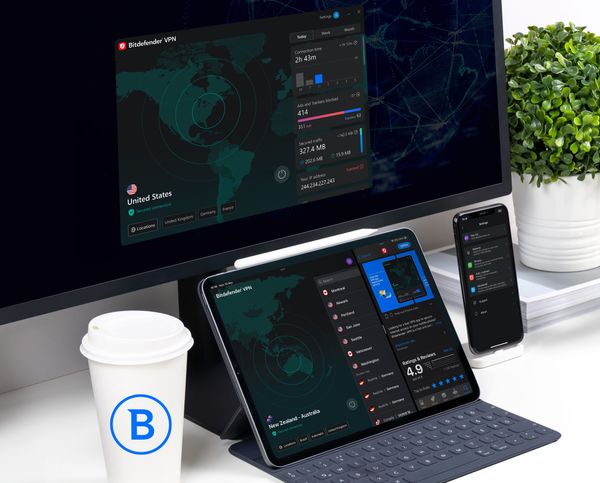Common VPN Myths Debunked

The topics of online privacy and anonymity have sparked heated debate in recent years. Some still believe that privacy is unnecessary, serving only to cloak shady activity. As cybercrime spreads and governments and corporations grow more intrusive, though, many have seen the importance of digital privacy. And they’re taking steps to achieve it.
Regardless of a user’s stance on digital privacy, all agree that VPN is a crucial step to protecting it.
Despite their popularity, many misconceptions about VPNs linger; how they work, their abilities, and how they should be used. Here are some of the most common VPN myths:
- VPNs are safe to use for illegal activities
- A VPN can make your Internet faster (or slower)
- Zero-log VPNs don’t collect any data
- VPNs protect you against all online security risks
- Only power users need VPNs
1. VPNs can hide shady online activity
While VPNs are highly efficient at keeping you anonymous online, they shouldn’t be deemed a free pass to engage in questionable or illegal activities. It’s generally perceived that wrongdoers often turn to VPN services to cover their tracks.
Reputable VPNs, especially those with strict zero-logging policies, keep minimal data about customers and encrypt it to prevent it from falling into the wrong hands. These traits make such VPN providers desirable to threat actors who sometimes use them to reroute their traffic.
However, VPNs don’t necessarily have to log or monitor your traffic to detect suspicious or illegal behavior. Setting up filters is far more effective and ensures customers don’t stray from the law without actively monitoring or logging their data.
The bottom line is that, although VPN can hide your online behavior from your ISP or the authorities, it doesn’t mean it’s only used for illegal activities.
2. VPNs can slow down (or speed up) your connection
In the past, many people avoided using a VPN for fear of slowing their connection. Although VPNs generally slow down your Internet connection, the speed loss is usually minimal, especially if you use a premium service.
Two things happen when connected to a VPN: your connection is re-routed through a secure server, and your traffic is encrypted.
These events strain your connection, which translates into speed loss. However, the slowdown depends on the location of the server you’re bouncing your connection through and the protocol used to encrypt your traffic, among other factors. Servers physically closer to you are generally faster, and some protocols yield better speeds than others.
Another misconception is that a VPN can significantly speed up your Internet connection; this isn’t necessarily a myth because a VPN can boost your connection in some cases. If your ISP is throttling (limiting) your bandwidth, a VPN can bypass this limitation and speed up your connection.
Note that a VPN is not a workaround to increase your bandwidth or give you a better Internet plan for free. If your connection is capped at 100 Mbps, a VPN won’t magically upgrade it to 1 Gbps.
3. Zero-log VPNs never log any data
This is one of the most common myths out there, but the wording of the claim is what generates the misconception. VPN services usually consist of large networks of servers where continuous data exchange occurs.
VPN providers need data from their customers for various reasons, ranging from analytics and improving the service to securing the infrastructure and protecting against cybercriminals.
Zero-logging usually means the provider keeps data logging to a minimum to ensure customers are anonymous while connected to the service. Zero-logging VPNs often require an email address and payment details from their customers but avoid logging IP addresses, timestamps and account-specific online activity.
On the other hand, some VPN services claim to enforce zero-logging policies, but a quick look at their privacy policies reveals a different reality. To avoid being tricked by false zero-logging claims, check the service’s policies, do your research, and stick with trustworthy VPNs.
4. VPN protects you against all kinds of cybersecurity risks
Despite their outstanding efficiency at keeping your online identity private, VPNs have a limited scope in protection against cyberattacks. In other words, a VPN will ensure your online activity stays private but won’t do much against viruses, malware, phishing attacks or other cybersecurity incidents.
VPNs can, however, keep you safe against man-in-the-middle attacks on public Wi-Fi networks, targeted attacks where the perpetrators could use your real IP address, online tracking and traffic monitoring.
If you’re concerned about your safety, specialized software such as Bitdefender Ultimate Security can help you achieve peace of mind by offering you all-around protection against a wide range of e-threats.
5. VPNs are only for tech-savvy users
Finally, a misconception that has led many to shy away from even trying a VPN is that they’re overly complicated. Building and setting up a VPN from scratch or configuring a VPN without a graphical user interface (GUI) could be challenging.
However, most VPNs are easy to install, configure and use. Simply install the client component on your preferred device, log in to your account (if you’re using a premium service), connect to a server, and leave it running in the background.
Experienced users could take advantage of the full array of features that a VPN offers and tinker with settings like toggling a kill switch, enabling split tunneling, changing protocols, or excluding websites or devices from the VPN tunnel.
However, most services take a user-friendly approach where the recommended settings are loaded by default, so you don’t have to worry about complicated steps to configuration. Bitdefender VPN, for instance, has a simple interface that lets you connect to the best server available at the press of a button.
Understanding VPNs can help you protect your privacy better
All things considered, numerous misconceptions about VPNs remain, prompting some people to avoid them. However, understanding how a VPN works can help you put those claims to rest and make the right choice to keep your online privacy safe.
tags
Author

Vlad's love for technology and writing created rich soil for his interest in cybersecurity to sprout into a full-on passion. Before becoming a Security Analyst, he covered tech and security topics.
View all postsRight now Top posts
Fake Download of Mission: Impossible – The Final Reckoning Movie Deploys Lumma Stealer
May 23, 2025
Scammers Sell Access to Steam Accounts with All the Latest Games – It's a Trap!
May 16, 2025
How to Protect Your WhatsApp from Hackers and Scammers – 8 Key Settings and Best Practices
April 03, 2025
FOLLOW US ON SOCIAL MEDIA
You might also like
Bookmarks








